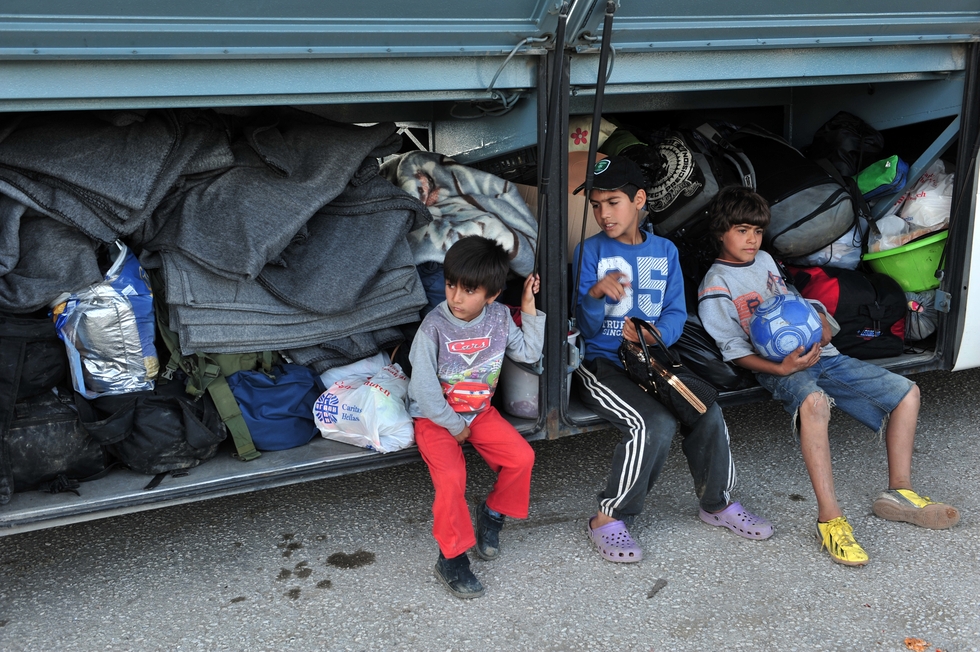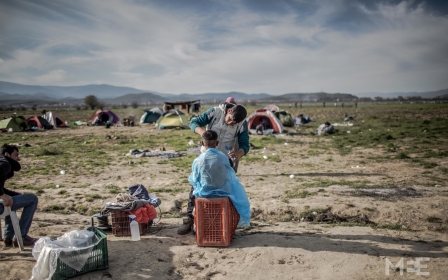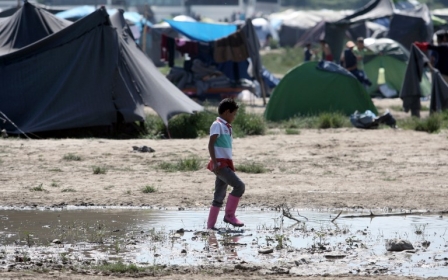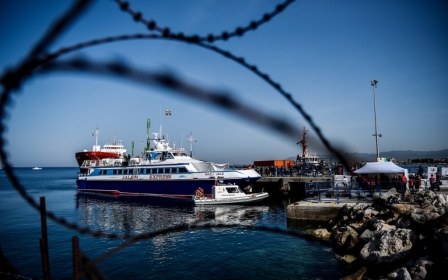Greek riot police begin clear-out of Idomeni refugee camp

Greece on Tuesday began an operation to clear the country's largest informal refugee camp of Idomeni, sending in more than 400 riot police and blocking access to the area in what was reported as a peaceful exercise.
In an operation that began shortly after sunrise, Greek police put more than 1,000 people on buses to newly opened camps near Greece's second city Thessaloniki, about 80 kilometres (50 miles) to the south.
Journalists were barred from the camp during the dawn operation, although 20 buses carrying riot police were seen heading to the area.
But footage and images handed out by state TV ERT and state agency ANA, who were allowed access, showed people queueing up to board buses and being driven away, some waving at the camera.
Many carried their worldly goods in huge bin bags, while others piled belongings into pushchairs, watched at a distance by groups of dark blue-clad police in white helmets.
The Greek government's refugee spokesman, Giorgos Kyritsis, said police would not use force to clear Idomeni, and that the operation was expected to last about a week to 10 days.
The operation began at about 6am local time "and is taking place slowly and in a calm atmosphere," he added. "There has not been any need to use force."
The news was welcomed by the EU officials, with spokesman Margaritis Schinas on Monday saying Brussels had "repeatedly expressed the view that these people should be moved from the makeshift camp to more organised reception facilities".
"We hope that [violence] will not be necessary," he said.
But few of those inside, however, appeared keen to move to new accommodation.
"It's much better here than in the camps. That's what everybody who's been there said," Hind al-Mkawi, a 38-year-old refugee from Damascus, told the Associated Press on Monday.
"We've already been here for three months and we'll have to spend at least another six in the camps before relocation. It's a long time. We don't have money or work - what will we do?"
MEE gained access to the camp on Monday evening and spoke with refugees inside. The majority of the camp’s inhabitants knew about the impending police operation but were confused and concerned about its purpose.
A group of young Syrian men, who did not wish to be identified, told MEE that they had no intention of leaving Idomeni as it was the closest point to the border should the border reopen.
At the EKO Gas Station Camp, an informal camp of 1,000 refugees just south of Idomeni, many refugees expressed concerns that they could be moved into government camps next.
Ghassan Ibrahim, a Syrian refugee from Damascus, said “some people here think we will be next, but I hope not. We don’t know what will happen, we are told nothing.”
Yassin Abu Rashid, a 14-year-old refugee also from Damascus, left with his family four years ago to live in Egypt, but decided to try and reach Europe due to poor economic prospects. His family made it as far as Greece but have been stuck at the EKO Gas Station since they arrived two months ago due to the border closure.
“Before [Greece] we were in Syria and then in Egypt, and the border was open and we thought it would be no problem to go to Europe. It was very dangerous to come here. And when we came here it was closed, and now we are very sad.
“[Refugees in Idomeni] don’t want to go out from the camp,” he said. “The army came to the camp and they said you must go, but the people don’t want to leave the camp. They just want to open the border.
“I am here in a tent. If I go to another camp there are tents. It’s the same, it’s not different.”
Many of the camp's residents are women and children keen to be reunited with male relatives who have pushed ahead on their own - with the aid of smugglers - hoping to find a place of refuge in EU states more financially viable than debt-hit Greece.
The leftist government of Greek Prime Minister Alexis Tsipras has for months been trying to persuade the camp's residents to move away from makeshift tent encampments at Idomeni and at the port of Piraeus for their own comfort and safety.
Over the past two weeks, Greek officials have managed to convince some 2,500 people to leave Idomeni, while the number at Piraeus was brought down from about 5,000 people in March to 1,500.
But many are wary of relocating to organised camps away from the border or the city of Athens because it could be harder to find people-smuggling contacts.
Will Horner contributed to this report.
New MEE newsletter: Jerusalem Dispatch
Sign up to get the latest insights and analysis on Israel-Palestine, alongside Turkey Unpacked and other MEE newsletters
Middle East Eye delivers independent and unrivalled coverage and analysis of the Middle East, North Africa and beyond. To learn more about republishing this content and the associated fees, please fill out this form. More about MEE can be found here.




